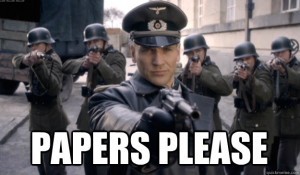
(Reprinted from The Defender, Winter 2006)
$300 million is a lot of money. So maybe, just maybe, we ought to think about this expenditure.
First of all, why do we need to lock up more people? Are we about to have a sudden crime wave? No. Maybe this need for more jail space is necessitated by the need to keep up the local trend of misusing the jail space we already have. What do I mean by that?
There are two kinds of people in jail: Those that belong there and those that don’t. I would argue that many of the 9,000 people currently in jail do not need to be there. Restated, the taxpayers are paying to house a lot of people the taxpayers should not be paying to house.
Who is in jail? People who are charged and not convicted and people who have been convicted who are serving a sentence.
There are far too many people in jail who arc charged and not convicted. 
There are far too many presumably innocent people in jail with cases pending. If you really want to free up some jail space give these people bond. Bond is not supposed to be used as a form of punishment, but it is. Far too often people arc stuck in jail because they simply cannot afford bond. If you don’t believe me, go to any of our fifteen county courts or our twenty-two district courts on a Monday morning and start counting heads of those who didn’t make bond.
Why are these people still in jail on Monday, when anybody with any sense and money would have bonded out? The answer is simple: They are still in jail because they are too poor to make bond.
If you cannot afford to make a $500 misdemeanor bond by definition you are poor. So we keep presumably innocent people in jail in this county because they arc poor. This is wrong. Supposedly we got rid of debtors’ prison a long time ago. Truth is, we still have it.
Since poor folks cannot afford to make misdemeanor bonds or state jail bonds, they arc cluttering up the jails. Why then aren’t they getting PR Bonds or Pre-trial Release Bonds? Can anybody answer that? I haven’t heard a good answer yet, and they are not all homeless.
Let me suggest a two-part answer: First, the judges, while well-intentioned, are still elected by voters who don’t know who they are. The judges worry about the “nightmare case” where they give a guy a Pre-trial Release Bond and he goes out and kills someone. So what do the judges do? They don’t grant Pre-trial Release Bonds. It’s safer for the judge to leave the presumably innocent person in jail then to release him on Pretrial Release Bond. While it may be politically safer for the judge, it is far more dangerous to the fundamental tenets of our system for the judge to keep the presumably innocent locked up for political reasons.
What is the second reason judges don’t grant Pre-trial Release Bonds? Well, the Pre-trial Release folks are simply overworked. A long time ago Pre-trial Release was created, at least in part, to provide an avenue to allow judges to release presumably innocent indigents on bond. I remember it actually happening at the old courthouse. Now, though, the same Pretrial service people are bogged down with their new job: Supervising bond conditions for those people lucky enough to actually make bond. If you don’t believe me, just go to the twelfth floor and watch.
As the years have worn on, the judges for a number of reasons have added more and more conditions to even the most mundane bonds. It has gotten to the point that bond conditions in some courts virtually mirror conditions of probation. Walk into any court and listen as bond conditions are set and you will swear the person has just pled guilty and is being sentenced. Nope. He is just getting bond conditions set. Once those conditions are set someone has to supervise them. Guess who? You got it, the good folks in Pre-trial Services.
So why are our jails overcrowded with presumably innocent folks?
Because, the courts refuse to utilize Pre-trial Services for its proper purpose.
What is the net effect? Defendants who are presumably innocent remain in custody. What happens to all these poor people who are denied Pretrial Release Bond? How is all this resolved for them?
The answer is simple and revolting to any sense of justice: Mass pleas of guilty.
Everyone reading this knows what I am talking about. Every Monday morning the lawyer for the day appears. He is assigned to represent 6-8 people. He goes back, says “Hi” to all his spanking new clients and then the District Attorney’s office extends offers. If “Joe” pleads guilty he gets thirty days, or if he wants to go to trial he can tee it up in sixty to ninety days. “Joe” takes the thirty. The system is set up to keep poor people in jail and to encourage pleas of guilty. If you have a choice of pleading guilty and getting out in ten days or pleading not guilty and maybe getting out in ninety days which choice would YOU take?
People who are presumably innocent are kept in jail and they plead guilty and they fill up our jails. It’s been our system far too long. A lot of people will probably not like my criticism of the system. Undoubtedly, I am painting with a broad stroke. But it is all true.
We don’t need to spend $300 million to build more jails; we need to let people out on Pre-trial Release Bonds and our jail problem will be solved. While we are at it, the courts need to stop illegally revoking bonds. When clients show up without an attorney that is no basis to revoke bond. Having an attorney is a right, not an obligation of bond.
In the meantime we can use that $300 million to support education and employment opportunities in the inner city. We can use that money to pay for drug rehabilitation and to support drug court. We have enough people in jail in Harris County.
Let’s take a hard look at our system and institute some long overdue changes. The solutions are as evident as the problems. All we need is the willingness to be honest with ourselves and the desire to do better.
 Houston, Texas – April 28, 2017 – It is with a sad heart that
Houston, Texas – April 28, 2017 – It is with a sad heart that 
